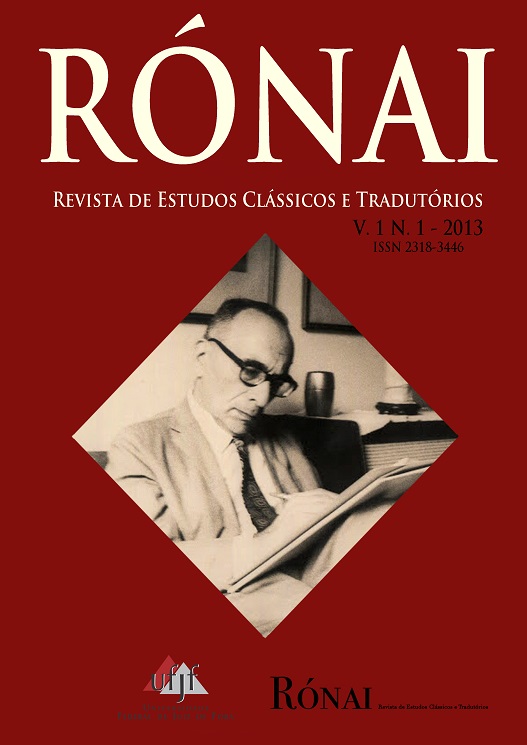Terêncio, a tradição e o estabelecimento do autor
Terence, the tradition and the establishment of author
Palabras clave:
comédia palliata, poética, tradição, Terêncio, prólogos terencianosResumen
Podemos inferir uma “poética” e, sobretudo, a tradição da comédia palliata tal qual definida por Terêncio (cujos recursos e autores ele procuraria emular) a partir de considerações do comediógrafo, tecidas nos prólogos de suas comédias, sobre a composição de uma palliata, as dificuldades para o ingresso na carreira teatral à época republicana em Roma e seu estabelecimento como sucessor de uma tradição de autores que ele próprio elenca.
Abstract
We could infer a certain “poetics” and, principally, the tradition of palliata comedy as defined by Terence (whose resources and authors he would try to emulate), from some considerations of the playwright, carried out in the prologues of his comedies on the composition of a palliata, the difficulties for his engagement on a theatrical carrier during Republican age at Rome, and his establishment as a successor of a tradition of authors which he lists himself.
Keywords: palliata comedy; poetics; tradition; Terence, Terencian prologues
Descargas
Citas
BRANDÃO, J. L. L. “Vida suetoniana de Terêncio. Estrutura e estratégias de defesa do poeta”. In Estudios sobre Terencio, 2006, p. 111-123.
BROWN, P. Terence: The Comedies (tr. intr. e notas). New York: Oxford, 2006.
CABOLI, G. “I termini della critica letteraria in Terenzio: appunti per um prolegomeno”, Voces, vol. 4, 1993, p. 41-54.
CONTE, G. B. Latin literature – A history. Baltimore: Johns Hopkins, 1994
DUCKWORTH, G. E. The Nature of Roman Comedy: A Study in Popular Entertainment. New Jersey: Princeton University Press, 1994.
DUPONT, Florence. “Recitatio and the Space of Public Discourse", in The Roman Cultural Revolution. Cambridge University Press, 1997.
FRANK, T. “Terence's Contribution to Plot-Construction”, The American Journal of Philology, vol. 49 nº 4, 1928, p. 309-322.
GLARE, P. G. W. (ed.) Oxford Latin Dictionary (OLD). Oxford: Clarendon Press.
GOLDBERG, S. M. Understanding Terence. N. Jersey: Princeton University Press, 1986.
GOWERS, E. “The Plot Thickens: Hidden Outlines in Terence's Prologues”, Ramus, vol. 33, 2004, p. 150-166.
MANUWALD, G. Roman Republican Theatre: A History. Cambridge: Cambridge University Press., 2011.
MAROUZEAU J. (ed.) Térence: Comédies. Paris, Les Belles Lettres, 2 v., 1947.
MCELDUFF, S. “More than Menander's acolyte: Terence as translator”, Ramus, vol. 33, 2004, p. 120-129.
MCGILL S. Plagiarism in Latin Literature. Cambridge University Press, 2012.
PARKER, H. N. “Plautus vs. Terence: Audience and popularity re-examined”, American Journal of Philology, vol. 117, nº 4, 1986, p. 585-617.
ROLFE, J. C. Suetonius – Vol. II. Cambridge, Mass.: Harvard University Press, 1959.
SHARROCK, A. Reading Roman Comedy: Poetics and Playfulness in Plautus and Terence. New York: Cambridge University Press, 2009.
SARGEAUNT J. (ed.) Terence vol. I: The Lady of Andros, The Self-Tormentor, The Eunuch (tr. intr. e notas). London: William Heinemann, 1912.
________________ Terence vol. II: Phormio, the Mother-In-law, the Brothers (tr. intr. e notas). London: William Heinemann, 1912.
WESSNER, P. Aeli Donati Commentum Terenti - Vol. II. Stuttgart, 1962.
WRIGHT, J. Dancing in Chains. The Stylistic Unity of the Comoedia Palliata. Rome: American Academy, 1974.
Descargas
Publicado
Cómo citar
Número
Sección
Licencia
Derechos de autor
Los autores que publican en esta revista aceptan los siguientes términos:
1. Los autores y las autoras conservan los derechos de autor y le otorgan a la revista el derecho a la primera publicación, que está bajo la licencia Creative Commons Attribution License 4.0 Internacional.
2. Los autores y las autoras pueden publicar y compartir el trabajo con reconocimiento de la publicación inicial en esta revista.
3. Los autores y las autoras de las obras aprobadas autorizan a la revista a asignar el contenido de sus obras, después de la publicación, para su reproducción en indexadores de contenido, bibliotecas virtuales y similares.
Para obtener más información sobre Creative Commons Attribution License 4.0 Internacional, acceda a: https://creativecommons.org/licenses/by/4.0/deed.es
Exención editorial
El contenido de los artículos publicados es responsabilidad única y exclusiva de sus autores, y no representa la posición oficial de Rónai - Revista de Estudos Clássicos e Tradutórios o de la Faculdade de Letras de la Universidad Federal de Juiz de Fora o instituciones asociadas.



